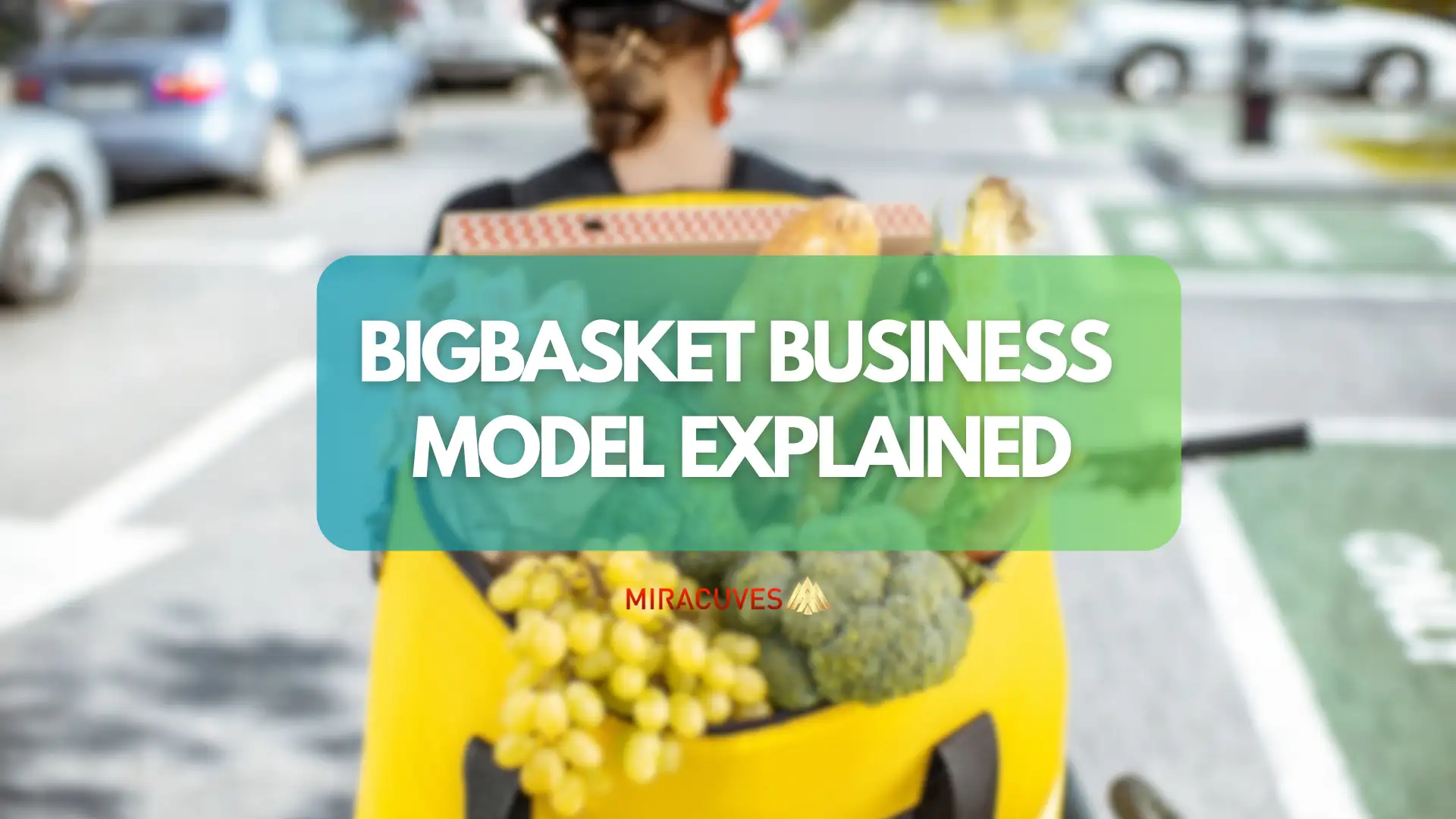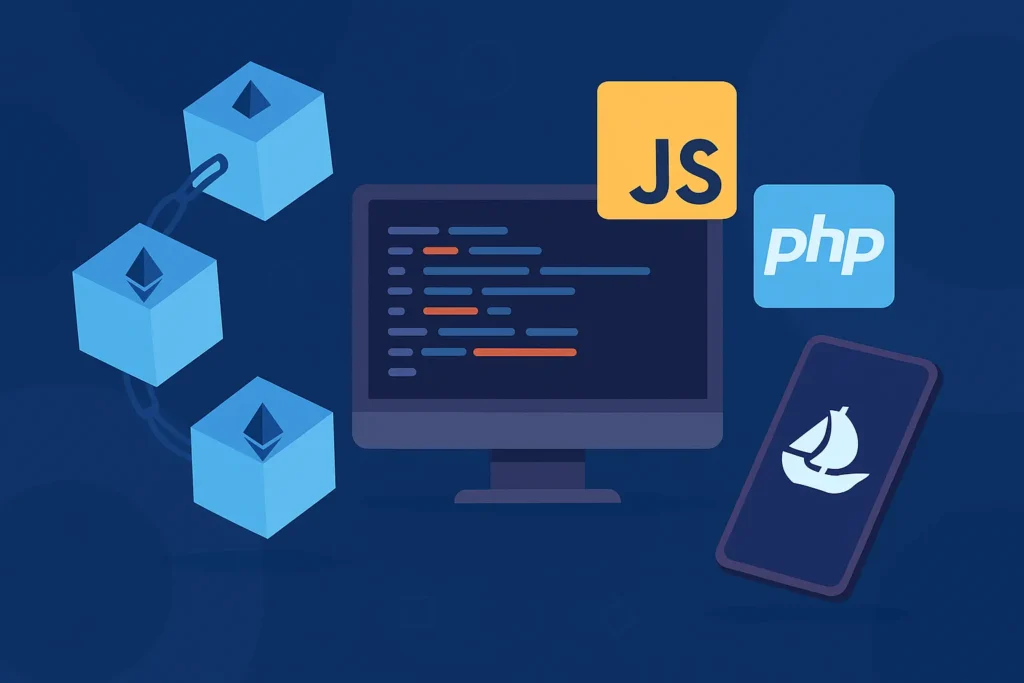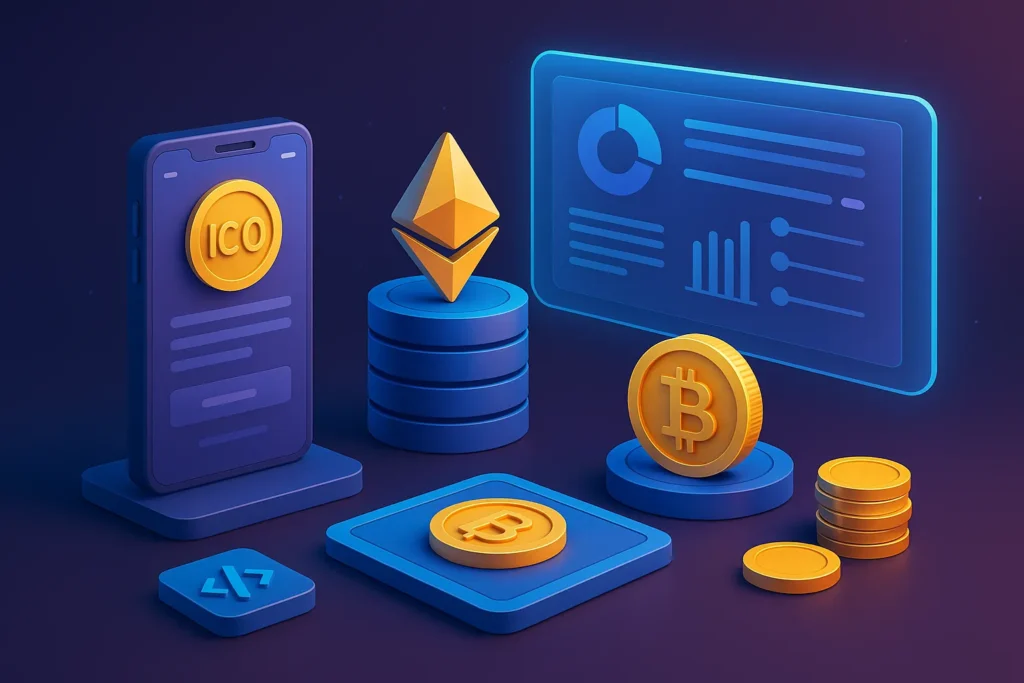BigBasket, India’s largest online grocery store, has revolutionized the way millions of people shop for groceries. In an era where convenience, speed, and variety dominate consumer preferences, BigBasket has emerged as a leader in the online grocery platform sector by offering an extensive range of products, seamless delivery services, and a customer-centric approach. Understanding BigBasket’s business model provides valuable insights into how it generates revenue, manages its operations, and continues to thrive in the competitive online grocery market.
This guide explores the key elements of BigBasket’s business, from its operational structure and revenue streams to its competitive advantages and future growth prospects. Through this exploration, we aim to uncover the mechanisms behind its success and provide practical insights for anyone interested in Launching grocery delivery services, ecommerce, and digital transformation in retail.
By delving into BigBasket’s strategies, we not only highlight how it became a dominant player in India’s grocery delivery landscape, but also why understanding these aspects is crucial for anyone looking to build a similar online grocery platform. Whether you’re an entrepreneur, a business strategist, or simply curious about the online grocery space, this comprehensive analysis will help you grasp how an ecommerce business model can be both profitable and sustainable.
Key Topics Covered:
- How BigBasket works and its operational model.
- Revenue streams that power BigBasket’s business.
- Competitive landscape and positioning among grocery delivery services.
- Strategic insights into customer retention, technology, and future opportunities.
Let’s begin by understanding BigBasket’s unique position and the fundamentals of its business model in the fast-growing ecommerce grocery market.
BigBasket’s Market Position
Since its inception, BigBasket has steadily grown into a dominant force in India’s online grocery delivery market. The platform caters to millions of customers, offering a vast selection of products ranging from fresh fruits and vegetables to household essentials. Its user-friendly interface, efficient delivery service, and wide range of grocery items have made it the go-to online grocery platform for urban consumers.
The Indian grocery market, traditionally dominated by physical stores and local vendors, saw a transformation with the advent of ecommerce platforms. BigBasket capitalized on this shift, building a robust digital presence and consistently expanding its customer base. This success can be attributed to BigBasket’s deep understanding of consumer needs, as well as its ability to scale operations rapidly in response to rising demand.
In a market filled with players like Amazon Fresh, Grofers, and Flipkart Supermart, BigBasket has managed to stand out due to its unique focus on the grocery sector. Unlike its competitors, BigBasket specializes exclusively in grocery delivery services, which has enabled it to refine its offerings and improve operational efficiency. Furthermore, by focusing on quick deliveries, especially in major cities, the company has captured the interest of consumers who prioritize convenience and variety.
Quick Commerce and Emerging Competitors
The rise of quick commerce apps, such as Blinkit (formerly Grofers) and Dunzo, has changed consumer expectations regarding delivery times, with services now being offered within minutes. BigBasket has responded by enhancing its operational model to include express deliveries, particularly for essential items. This adaptation helps it remain competitive while also appealing to time-sensitive customers.
BigBasket’s strategic partnerships and consistent innovation have cemented its place as the leader in this industry. It continues to be a significant player, not just in the grocery market but also as a driver of the grocery delivery business revolution in India.
How BigBasket Works
BigBasket operates on a sophisticated online grocery platform that integrates multiple layers of technology, logistics, and customer service to offer a seamless shopping experience. At its core, BigBasket follows a multi-step process that ensures consumers get their groceries delivered efficiently and promptly.
Customer Interaction
The journey begins when a customer logs onto the platform via its website or mobile app. The platform offers an intuitive interface, allowing users to easily browse through thousands of products categorized by type, brand, or dietary preferences. BigBasket also leverages personalized recommendations based on a user’s shopping history, which enhances the customer experience by making it quicker and more relevant.
Once the customer selects their items and places an order, the system sends the details to the nearest fulfillment center, ensuring quick processing and preparation. BigBasket has strategically positioned warehouses across cities to ensure timely order fulfillment, minimizing delays in the delivery process.
Fulfillment and Delivery
BigBasket’s real operational strength lies in its well-managed supply chain and fulfillment network. The platform operates a combination of central warehouses and local distribution centers that work in tandem to process orders. When an order is placed, it is routed to the nearest facility where the products are picked, packed, and dispatched. To ensure fresh produce, BigBasket maintains a cold chain system for perishable goods like fruits, vegetables, and dairy products.
For deliveries, BigBasket uses a network of in-house delivery personnel and third-party logistics partners. This hybrid approach allows the company to ensure timely deliveries even during peak demand periods. Customers can choose from various delivery slots based on their convenience, enhancing the platform’s flexibility.
Tech-Driven Efficiency
BigBasket’s use of data analytics, artificial intelligence (AI), and machine learning (ML) has been pivotal in optimizing its operations. The platform predicts inventory needs, manages stock levels efficiently, and routes deliveries using AI-driven algorithms to reduce delivery times. This ensures that the company’s grocery delivery business runs smoothly, with minimal waste and higher efficiency, especially during high-demand periods.
Payment and Post-Purchase
Once the order is delivered, customers can make payments via various methods, including digital wallets, cards, or cash on delivery (COD). BigBasket also offers a hassle-free returns process, allowing customers to return items that may not meet their expectations.
This customer-centric operational model has enabled BigBasket to retain its competitive edge in a crowded market, offering both convenience and reliability to users.
Revenue Streams in BigBasket’s Business Model
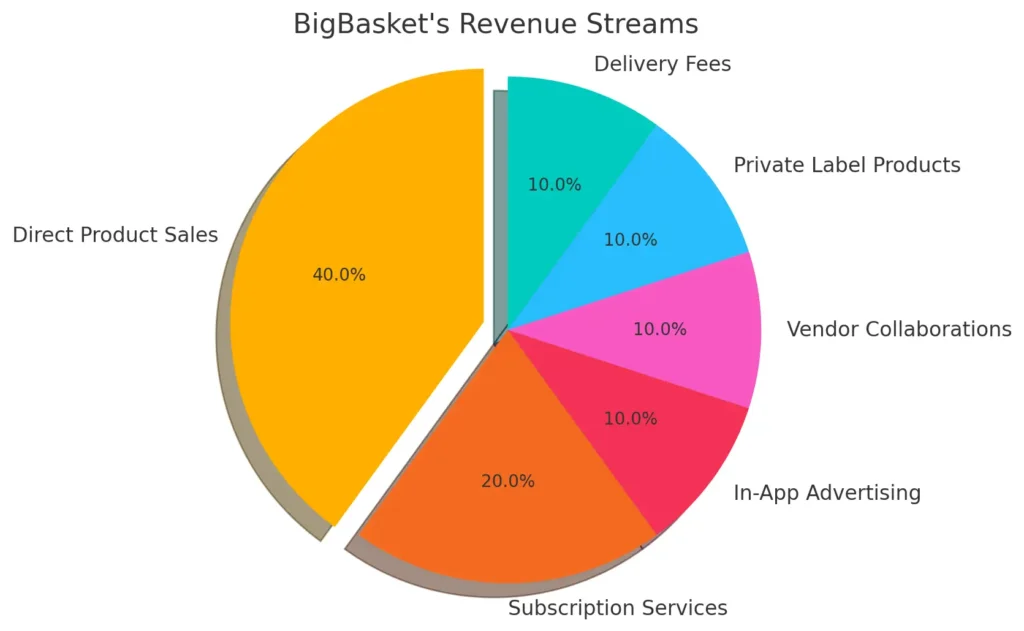
BigBasket’s business model revolves around multiple revenue streams, allowing it to diversify income while maintaining profitability in the competitive online grocery platform space. Here’s a breakdown of its primary and secondary revenue sources:
1. Primary Revenue Sources
- Direct Product Sales: As with any retail business, BigBasket earns a significant portion of its revenue from selling grocery items directly to consumers. The company offers a wide range of products, including fresh produce, packaged goods, and household items. BigBasket operates on a margin-based model, purchasing products from suppliers at wholesale prices and selling them to customers at retail prices. The margin on these products, though often small, contributes substantially due to the platform’s high order volume.
- Subscription Services (BB Star Program): BigBasket’s BB Star membership program is another critical revenue source. For a yearly or monthly subscription fee, customers gain access to benefits like priority delivery, special discounts, and exclusive offers. This loyalty program not only drives repeat business but also adds a steady stream of recurring revenue for the platform.
2. Secondary Revenue Sources
- In-App Advertising: BigBasket monetizes its platform by allowing brands to advertise directly to its customers. FMCG companies often use BigBasket’s platform to promote their products through banner ads, sponsored product placements, and promotional campaigns. This gives BigBasket an additional revenue stream while providing advertisers with targeted exposure to grocery shoppers.
- Vendor Collaborations and Commissions: BigBasket partners with local vendors and suppliers, offering them a platform to sell their products to a broader audience. In return, BigBasket takes a commission on each sale, adding to its overall revenue. This strategy not only diversifies the product range but also creates a symbiotic relationship between local businesses and the platform.
- White-Label Products: Another growing revenue source is BigBasket’s introduction of private-label products under its own brand. These products, ranging from staples like rice and flour to cleaning supplies, are sold at competitive prices while offering higher margins than traditional third-party brands.
3. B2B Services
- Bulk Sales and Corporate Partnerships: BigBasket also caters to corporate clients and institutions, offering bulk grocery delivery services. This B2B arm generates revenue through large-scale orders for businesses, restaurants, and offices, which rely on the platform for their bulk purchasing needs.
4. Delivery Fees
- Although many orders qualify for free delivery based on minimum order values, BigBasket charges delivery fees for smaller orders. These fees vary depending on the customer’s location and the type of delivery service chosen (standard or express), providing another supplementary revenue stream.
| Revenue Stream | Description |
|---|---|
| Direct Product Sales | Revenue from selling grocery items directly to customers. |
| Subscription Services (BB Star) | Recurring revenue from subscription fees for exclusive benefits like discounts and priority delivery. |
| In-App Advertising | Revenue from FMCG companies for promotional space and sponsored listings on the platform. |
| Vendor Collaborations | Commissions from local vendors for selling their products through the BigBasket platform. |
| Private Label Products | Higher-margin products sold under BigBasket’s own brand. |
| Delivery Fees | Fees charged for small orders or express delivery options. |
Through these diverse revenue streams, BigBasket has built a resilient and scalable business model. Its focus on direct product sales, supported by advertising and subscription services, has enabled the company to grow steadily while staying profitable in an increasingly competitive industry.
Read More “Building OnlyFans Clone Script in 2025: Unleash Elite Potential“
Ecommerce Grocery Business Infrastructure
BigBasket’s success is rooted in its efficient and scalable grocery delivery business infrastructure, which integrates supply chain management, warehousing, and last-mile delivery logistics.
1. Centralized and Local Warehouses
- BigBasket operates a hybrid model of large centralized warehouses and smaller local distribution centers. Centralized warehouses store high-demand, non-perishable items, while local fulfillment centers handle fresh produce and perishable goods, allowing for faster deliveries. This setup ensures customers receive fresh items with minimal lead time, reducing the risk of spoilage.
2. Cold Chain for Perishable Goods
- BigBasket’s cold chain system is integral for maintaining the quality of perishable goods such as fruits, vegetables, dairy, and meats. The company has invested heavily in temperature-controlled warehouses and delivery vehicles to ensure products remain fresh from the warehouse to the customer’s doorstep.
3. Vendor and Inventory Management
- BigBasket’s vendor partnerships form a crucial part of its supply chain. The platform sources products directly from farmers, FMCG companies, and local grocery stores. This vendor network allows BigBasket to maintain a wide selection of products and ensure competitive pricing. The platform uses sophisticated inventory management software to predict stock levels and avoid shortages or overstocking.
4. Technology-Driven Operations
- Technology plays a key role in BigBasket’s infrastructure. The company leverages AI and machine learning algorithms to optimize inventory management, predict consumer demand, and streamline the logistics of product delivery. By using real-time data analytics, BigBasket ensures efficient routing of delivery vehicles, reducing delays and operational costs.
5. Last-Mile Delivery
- BigBasket has developed a robust last-mile delivery network that blends in-house logistics teams with third-party delivery services. This hybrid model ensures that customers in both metro cities and smaller towns receive their orders quickly and reliably. For urgent deliveries, the platform offers an express delivery option that guarantees groceries in under two hours, enhancing customer satisfaction and convenience.
BigBasket’s attention to optimizing its ecommerce grocery business infrastructure has made it a reliable and scalable platform, capable of meeting growing demand across urban and semi-urban markets. By balancing technological innovation with operational efficiency, the company ensures the seamless delivery of groceries, which is critical to maintaining its competitive edge.
Competitive Landscape
The online grocery market in India is highly competitive, with several established players and emerging quick commerce apps challenging BigBasket’s dominance. While BigBasket remains a leader due to its specialization in the grocery sector, it faces stiff competition from platforms like Amazon Fresh, Grofers (now Blinkit), and Flipkart Supermart.
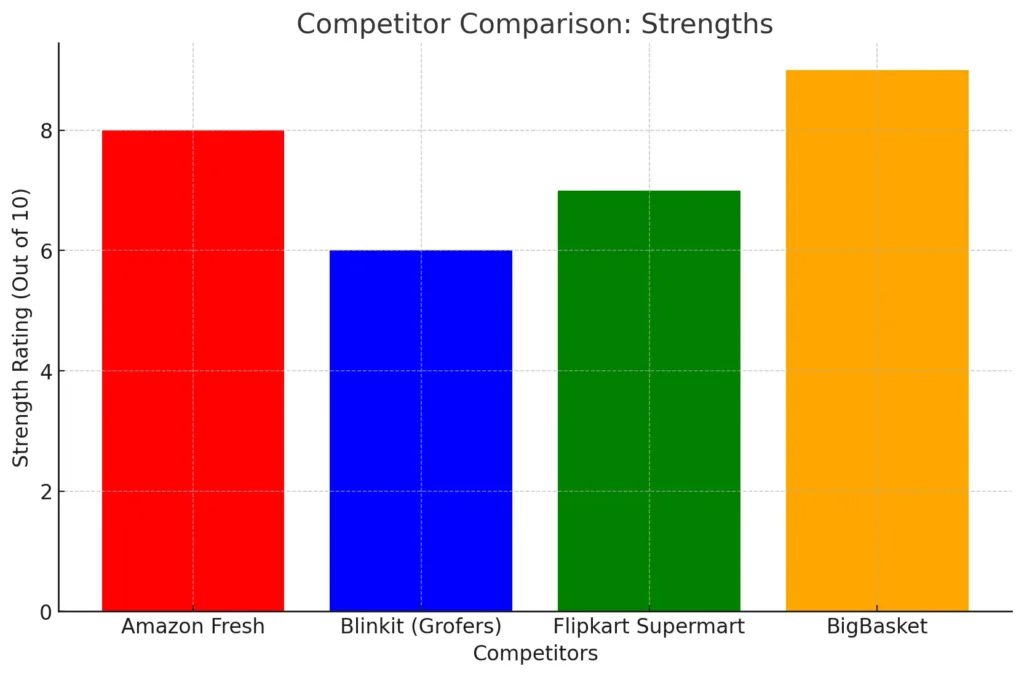
1. Direct Competitors
- Amazon Fresh: With its global brand power and established logistics, Amazon Fresh is a formidable competitor. Offering a wide range of groceries along with other retail items, Amazon leverages its vast infrastructure to compete on delivery speed and pricing.
- Grofers/Blinkit: Initially a key competitor, Grofers has rebranded as Blinkit and now focuses on quick commerce. The 10- to 20-minute delivery promise appeals to urban consumers who prioritize speed over variety, and this has posed a significant challenge to BigBasket’s traditional delivery model.
- Flipkart Supermart: Backed by Walmart, Flipkart Supermart offers competitive pricing and free delivery services, aiming to capture a significant share of the growing online grocery market in India.
2. Differentiation and Strategy
- While Amazon and Blinkit compete on speed and scale, BigBasket’s strength lies in its focus on groceries, including fresh produce, which requires more complex logistics. The company has also differentiated itself through its BB Star subscription program, which encourages customer loyalty through exclusive offers, discounts, and priority delivery.
- Additionally, BigBasket continues to evolve its delivery options by adding express services to match the convenience of quick commerce apps like Blinkit, while maintaining its superior product range and quality.
3. Threats from Quick Commerce
- Quick commerce has redefined customer expectations in urban areas, with many consumers now expecting deliveries within minutes rather than hours. This shift presents a significant challenge for traditional players like BigBasket, which relies on a more centralized warehousing model.
- However, BigBasket’s focus on product quality and variety, particularly in fresh produce, gives it a competitive edge over ultra-fast delivery services that often prioritize speed over the range and freshness of products.
4. Future Competitive Strategies
- To remain competitive, BigBasket continues to invest in technology, optimizing its logistics through AI-driven systems to improve delivery times and reduce operational costs. Additionally, the platform has expanded its product offerings to include non-grocery items, further enhancing its appeal to a broader audience.
- The company’s strategic partnerships with local vendors and focus on premium services such as BB Star also help maintain customer loyalty in a highly competitive market.
| Competitor | Strengths | Weaknesses |
|---|---|---|
| Amazon Fresh | Strong logistics, wide range of products | Focus on multiple categories, not groceries exclusively |
| Blinkit (Grofers) | Quick delivery (10-20 minutes) | Limited product variety, not as strong on fresh produce |
| Flipkart Supermart | Competitive pricing, free delivery options | Focus on Tier 1 and Tier 2 cities, slower expansion in other areas |
With competition growing from both established giants and agile quick-commerce platforms, BigBasket’s ability to differentiate through quality, variety, and smart logistics will be key to maintaining its leadership in India’s grocery delivery business.
Ready to launch a profitable grocery delivery business?
Start Your Grocery Delivery Business Today , We’ll
guide you through building a scalable model
that ensures growth.
Customer Experience and User Retention Strategies
BigBasket’s focus on customer experience is central to its success in the online grocery platform space. The company has developed various strategies to ensure that customers not only use the service but remain loyal to it.
1. Personalized Shopping Experience
- BigBasket leverages customer data to offer personalized product recommendations, simplifying the shopping process. Customers are shown items they frequently purchase, along with curated suggestions based on past behaviors, which streamlines their experience and adds convenience.
2. BB Star Program (Loyalty Program)
- The BB Star subscription service is one of BigBasket’s key retention tools. It offers members benefits such as priority delivery, exclusive discounts, and lower minimum order amounts for free delivery. This loyalty program encourages repeat purchases and helps to reduce customer churn by providing value that goes beyond the regular shopping experience.
- In addition to monetary benefits, the BB Star program fosters a sense of exclusivity, giving customers a reason to maintain their subscription and stick with the platform.
3. Flexible Delivery Options
- BigBasket offers a range of delivery options to suit different customer preferences, from same-day delivery to express two-hour slots for urgent orders. Customers can choose from various time slots depending on their convenience, making it easy to fit grocery shopping into their busy schedules. This flexibility enhances customer satisfaction and contributes to long-term retention.
4. Post-Purchase Engagement and Feedback
- BigBasket maintains active post-purchase engagement with its customers. After every purchase, the platform encourages customers to rate the products and delivery service. By analyzing feedback and addressing any concerns quickly, BigBasket fosters a relationship of trust with its users.
- Regular engagement through personalized offers, app notifications, and reminders for frequently purchased items keeps customers connected to the platform and encourages repeat business.
5. Customer Support and Issue Resolution
- A strong customer support system is integral to BigBasket’s user retention strategy. The platform offers 24/7 customer service to resolve any issues related to orders, product quality, or refunds. Prompt and efficient issue resolution builds trust and enhances customer loyalty.
6. Quality Assurance and Product Freshness
- One of BigBasket’s primary value propositions is the quality and freshness of its products, particularly its fresh produce. The platform has a strict quality control process that ensures customers receive fresh and high-quality products. This focus on delivering quality helps the company build long-term trust with its customer base.
| Retention Strategy | Benefits |
|---|---|
| BB Star Loyalty Program | Encourages repeat purchases with exclusive discounts and priority delivery. |
| Personalized Shopping Experience | Improves customer satisfaction through relevant product recommendations. |
| Flexible Delivery Options | Increases customer convenience by offering same-day and scheduled deliveries. |
| Post-Purchase Engagement | Maintains customer loyalty with personalized offers and feedback loops. |
By combining personalization, convenience, and quality with responsive customer service, BigBasket has built a robust customer retention strategy that continues to drive its growth in the highly competitive grocery delivery business.
Technology Stack Behind BigBasket
BigBasket’s operational efficiency and customer-centric platform are powered by a cutting-edge technology stack that integrates multiple tools and solutions to ensure smooth functionality across its entire ecosystem. The use of advanced technologies enables the company to handle the complexities of online grocery delivery, from inventory management to last-mile logistics.
1. Mobile Application and Web Platform
- BigBasket’s user interface, both on mobile and desktop, is built to offer a seamless shopping experience. The app and website are developed using a combination of frameworks such as React Native for mobile and Angular for the web. These technologies ensure smooth navigation, fast loading times, and an intuitive user experience.
2. Cloud Infrastructure
- The platform operates on a scalable cloud infrastructure that allows it to handle large volumes of traffic and transactions, particularly during high-demand periods. BigBasket leverages services like Amazon Web Services (AWS) for hosting, ensuring uptime, data security, and efficient resource management.
3. AI and Machine Learning
- BigBasket uses Artificial Intelligence (AI) and Machine Learning (ML) algorithms for various tasks such as personalized product recommendations, demand forecasting, and dynamic pricing. AI helps the platform predict customer preferences, improving the shopping experience through better product suggestions.
- In addition, AI-powered systems optimize inventory management, reducing stockouts and minimizing waste by forecasting demand for perishable goods.
4. Data Analytics
- Data analytics is at the core of BigBasket’s operational efficiency. The platform tracks user behavior, order history, and inventory data to make data-driven decisions. Insights from this data help improve delivery logistics, optimize product listings, and enhance marketing efforts, ensuring that the company continues to meet customer expectations.
5. Logistics and Supply Chain Technology
- To ensure timely deliveries, BigBasket has integrated sophisticated logistics management software that optimizes delivery routes in real time. This system takes into account factors like traffic, weather conditions, and delivery priorities to minimize delivery times and fuel costs.
- Supply chain management (SCM) software is used to streamline the entire process, from vendor sourcing to product delivery. This system ensures that fresh produce is quickly transported from suppliers to warehouses and then to customers.
6. Payment Gateway Integration
- The platform supports multiple payment methods, including digital wallets, credit/debit cards, and cash on delivery (COD), thanks to secure payment gateway integrations. BigBasket uses robust encryption and fraud detection technologies to ensure safe and secure transactions.
7. AI for Fraud Detection and Prevention
- AI also plays a critical role in fraud prevention, detecting suspicious activities like payment fraud, fake accounts, and fraudulent orders. This helps in building trust and ensuring a secure shopping experience for users.
| Technology | Purpose |
|---|---|
| React Native / Angular | Used for mobile app and web platform development for smooth UX/UI. |
| Amazon Web Services (AWS) | Cloud infrastructure to ensure scalability and data security. |
| AI and Machine Learning | Inventory management, demand forecasting, personalized recommendations. |
| Data Analytics | Drives decision-making, marketing, and supply chain optimization. |
| Logistics Management Software | Optimizes delivery routes and reduces operational costs. |
| Payment Gateway Integration | Ensures secure and seamless payment processing. |
By leveraging this powerful technology stack, BigBasket maintains its operational excellence, delivering a smooth and reliable experience to its users while optimizing costs and resources. The platform’s investment in technology not only supports its current scale but also positions it for future growth in the grocery delivery business.
Partnerships and Collaborations
BigBasket’s ability to scale and deliver efficiently is largely supported by its extensive network of partnerships and collaborations. These partnerships span across suppliers, logistics providers, and financial institutions, all of which contribute to the company’s seamless operations.
1. Supplier Partnerships
- BigBasket collaborates with a wide range of suppliers, including local farmers, large FMCG (Fast-Moving Consumer Goods) companies, and wholesalers. This network allows BigBasket to maintain a vast inventory of products, from fresh produce to household staples. Partnering directly with farmers helps the platform ensure fresh products while also supporting local agricultural communities.
2. Vendor and Brand Collaborations
- The company has established partnerships with well-known FMCG brands like HUL, ITC, and Nestlé, offering them premium shelf space on the platform. These brands also collaborate with BigBasket for exclusive launches and promotions, further enhancing product visibility and sales.
3. Third-Party Logistics Partners
- Although BigBasket has its own fleet for last-mile delivery, the company also partners with third-party logistics providers to manage surges in demand. This hybrid approach allows BigBasket to scale its delivery operations quickly, especially during peak times like festivals or lockdown periods.
4. Payment Gateway and Financial Collaborations
- BigBasket has partnered with multiple digital payment providers, including Paytm, Razorpay, and other banking institutions. These partnerships help facilitate smooth transactions and offer users multiple payment options, boosting customer satisfaction. Additionally, BigBasket frequently collaborates with banks and payment apps to offer cashback and discounts, which drives customer engagement.
5. Collaborations for Sustainability Initiatives
- The company has also teamed up with several eco-friendly organizations to promote sustainable packaging solutions and waste reduction. BigBasket is making a concerted effort to reduce its environmental footprint, and partnerships in this space help the company implement green practices across its supply chain.
These partnerships and collaborations play a critical role in BigBasket’s ability to expand its product offerings, ensure operational efficiency, and maintain its competitive edge in the grocery delivery business.
Sustainability and Ethical Practices
BigBasket has been actively working towards creating a more sustainable and ethical business model. The company has introduced various initiatives aimed at reducing its environmental impact while supporting local communities and farmers.
1. Sustainable Packaging
- BigBasket has gradually replaced plastic packaging with eco-friendly alternatives. The company uses biodegradable materials for grocery deliveries and encourages customers to recycle packaging. This initiative helps reduce plastic waste, particularly in urban areas.
2. Local Sourcing and Farmer Support
- BigBasket partners directly with farmers for the procurement of fresh produce. By sourcing locally, the company ensures minimal transportation emissions and also provides fair prices to the farmers. This support extends to promoting sustainable farming practices, which benefit both the environment and the communities that rely on agriculture.
3. Waste Reduction and Management
- The company has implemented waste management strategies, including donating unsold but consumable products to charities and food banks. This not only helps reduce food wastage but also contributes to social welfare initiatives.
- BigBasket is also exploring advanced technology to manage food storage efficiently, ensuring that perishable goods are stored and transported under optimal conditions to minimize spoilage.
4. Energy-Efficient Operations
- BigBasket is gradually transitioning its warehouses and delivery operations to more energy-efficient practices, including the use of renewable energy in its fulfillment centers. The company is also piloting electric vehicles (EVs) for last-mile delivery, reducing its carbon footprint.
By adopting these sustainability and ethical practices, BigBasket not only appeals to environmentally-conscious consumers but also aligns its operations with global sustainability standards. This focus on ethical practices helps build trust and loyalty among its customers, contributing to the company’s long-term success in the grocery delivery business.
Marketing and Customer Acquisition Strategies
BigBasket employs a variety of marketing and customer acquisition strategies to maintain its market leadership and continuously grow its user base.
1. Digital Marketing and SEO
- BigBasket focuses on digital marketing, using targeted advertising on social media platforms like Facebook, Instagram, and Google Ads to reach its audience. Additionally, the platform invests in search engine optimization (SEO) to ensure high visibility in search engine results when users search for grocery delivery services, which drives organic traffic to its site and app.
2. Referral and Reward Programs
- To boost customer acquisition, BigBasket runs referral programs that incentivize existing customers to invite their friends and family. These programs offer discounts or cashback on future purchases, which helps attract new customers while retaining existing ones.
3. Discounts, Cashback, and Exclusive Offers
- BigBasket regularly collaborates with banks, digital wallets (like Paytm), and other financial services to offer discounts and cashback deals to customers. These offers encourage users to make larger purchases or try the service for the first time. Additionally, special promotions are often run during festive seasons, driving a significant spike in sales.
4. Influencer Marketing and Brand Collaborations
- The company leverages influencer marketing to build brand awareness and credibility. By collaborating with food bloggers, chefs, and influencers, BigBasket showcases the ease and convenience of using its platform. These collaborations often include special promo codes, encouraging followers to try out the service.
5. Partnerships with FMCG Brands
- BigBasket partners with popular FMCG brands for exclusive launches, promotional campaigns, and co-branded discounts. These collaborations not only help increase sales but also give BigBasket access to the customer base of these brands.
6. Personalized Offers and Customer Retargeting
- BigBasket uses data analytics to offer personalized discounts and recommendations based on customer shopping behavior. Retargeting strategies, like sending push notifications or emails with tailored offers, help bring back customers who have not shopped in a while, increasing customer retention.
By combining traditional digital marketing methods with customer-focused initiatives such as referral programs, BigBasket ensures it remains top-of-mind for both existing and potential customers in the competitive online grocery platform space.
Future of BigBasket and Quick Commerce
As the online grocery platform landscape continues to evolve, BigBasket is preparing for the future by embracing quick commerce and emerging technologies. The growing demand for ultra-fast delivery services, driven by platforms like Blinkit and Dunzo, is pushing BigBasket to enhance its delivery options.
1. Express Delivery Services
- BigBasket is expanding its express delivery services, especially in metropolitan cities, to compete with quick commerce apps that promise delivery within 10-20 minutes. By building more local fulfillment centers, BigBasket aims to meet this rising consumer expectation for speed.
2. Technology Integration
- The company is exploring new technologies such as drone deliveries, AI-powered inventory management, and automated warehouses to streamline operations further and reduce delivery times. These advancements will help BigBasket stay ahead of the curve as the grocery delivery business becomes more tech-driven.
3. Expansion into Tier 2 and Tier 3 Cities
- Beyond metro areas, BigBasket is looking to expand its reach into Tier 2 and Tier 3 cities, where online grocery shopping is still gaining traction. By focusing on these growing markets, BigBasket aims to capture a larger share of the grocery delivery market across India.
4. Sustainability in Future Operations
- As customer awareness around sustainability grows, BigBasket is expected to further its investment in eco-friendly practices, such as using electric delivery vehicles and sustainable packaging. These initiatives not only meet environmental goals but also enhance the brand’s appeal to eco-conscious consumers.
5. Leveraging AI for Quick Commerce
- BigBasket plans to use AI more extensively to predict consumer demand, manage stocks more efficiently, and optimize its delivery routes. This data-driven approach will be crucial in maintaining profitability and meeting customer expectations for faster deliveries without sacrificing quality or increasing operational costs.
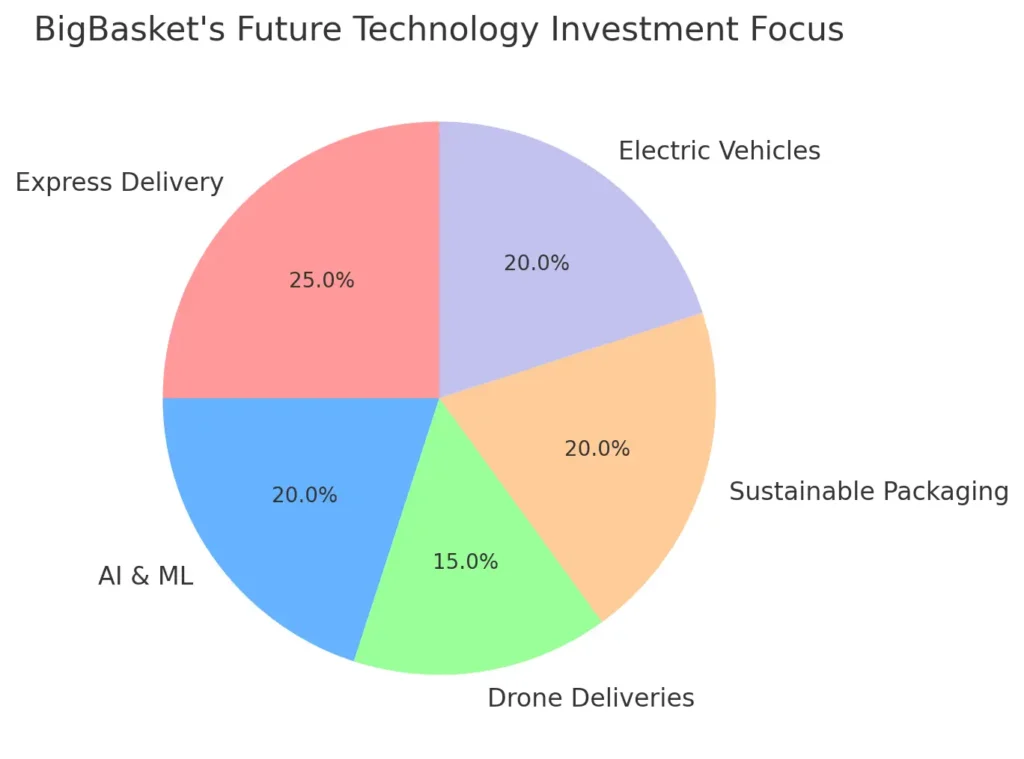
By adapting to the quick commerce model and continuing to innovate, BigBasket is well-positioned to maintain its leadership in the Indian grocery delivery business. Its focus on both expanding services and leveraging technology will ensure that it remains competitive in an industry that is rapidly evolving.
Conclusion
BigBasket has successfully established itself as the leading online grocery platform in India by leveraging a combination of technological innovation, strategic partnerships, and a deep understanding of consumer needs. Through its scalable business model, diverse revenue streams, and focus on customer experience, BigBasket continues to outpace competitors in the rapidly growing grocery delivery business. As the market evolves with the rise of quick commerce, BigBasket is well-positioned to adapt by expanding its services, optimizing its infrastructure, and staying ahead through technological advancements.
With its strong foundation and future-forward approach, BigBasket is not only shaping the future of grocery delivery in India but also setting a benchmark for other ecommerce platforms. Whether through its emphasis on customer loyalty programs, sustainable practices, or adoption of cutting-edge technologies, BigBasket’s business model offers valuable insights for businesses looking to succeed in the digital retail space.
Looking to build your own online grocery platform like BigBasket? Miracuves offers customized solutions to help you launch your business with ease. Our team specializes in developing scalable, feature-rich grocery delivery apps tailored to your business needs. With quick delivery, seamless integration of AI-driven inventory systems, and advanced customer engagement features, we ensure your platform is built for success.
Contact us today to explore how we can turn your idea into a thriving business model. Get started with Miracuves—your partner in digital innovation!
Visit Miracuves to learn more.
Create your own grocery app like BigBasket?
We’ll help you build a feature-packed platform with easy
deliveries, secure payments, and a wide
product range .
FAQs
How does BigBasket’s business model work?
BigBasket operates on a multi-revenue stream model, primarily earning through direct product sales, subscription services like BB Star, and commissions from vendor collaborations. The platform also generates income through in-app advertising and express delivery fees.
What are the revenue streams of BigBasket?
BigBasket’s revenue comes from direct grocery sales, subscription services (BB Star), in-app advertising, vendor commissions, private-label products, and delivery fees for smaller orders.
How does BigBasket manage its logistics and delivery?
BigBasket uses a hybrid logistics model with central warehouses and local fulfillment centers, supported by both in-house and third-party delivery services. AI optimizes delivery routes, ensuring timely order fulfillment.
What is the BB Star program in BigBasket?
BB Star is BigBasket’s loyalty program that offers customers benefits like priority delivery, exclusive discounts, and lower minimum order amounts, enhancing customer retention.
Who are BigBasket’s main competitors?
BigBasket competes with platforms like Amazon Fresh, Blinkit (Grofers), and Flipkart Supermart. While competitors focus on speed, BigBasket stands out for its range of fresh produce and grocery variety.
How is BigBasket adopting sustainability practices?
BigBasket promotes sustainability by using eco-friendly packaging, supporting local farmers, reducing plastic use, and adopting energy-efficient practices in warehouses and delivery operations.



